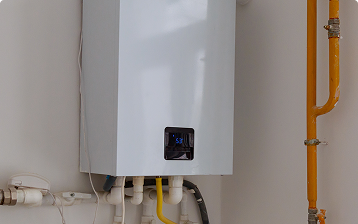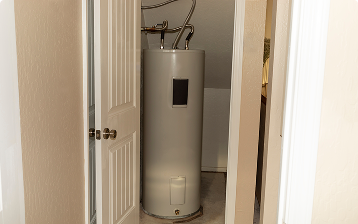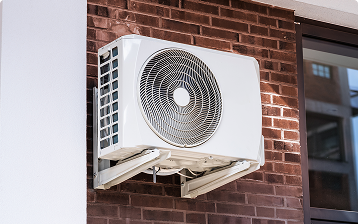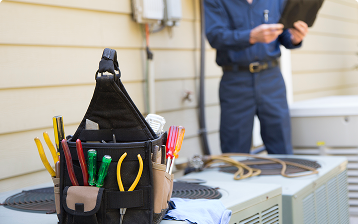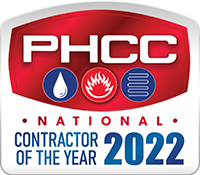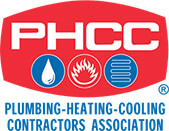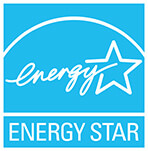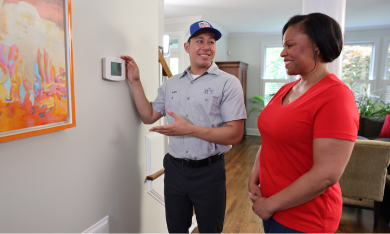

Considering how hot and humid the Jacksonville area is, it’s important to have an air conditioner or heat pump that’s as efficient as possible. This can improve your comfort and keep your cooling costs to a minimum.
The SEER rating was created to make it easier to compare the efficiency of different AC models, and this guide will explain how to use it to find the best air conditioner for your needs.
SEER Ratings 101: What Do They Really Mean?
Seasonal energy efficiency ratio, or SEER, represents the amount of cooling that an air conditioning system can provide per kilowatt-hour of electricity over the typical cooling season.
As an alternative to using manufacturer specifications, this figure offers a more accurate way to compare the real-world seasonal efficiency and performance of different brands and models.
SEER standards are set by the U.S. Department of Energy, but the actual testing and rating processes are performed by the Air Conditioning, Heating, and Refrigeration Institute in a controlled environment that simulates real-world weather conditions.
By comparing SEER ratings when shopping for a new HVAC system, you can ensure you get the most efficient cooling system for your budget.
How SEER Ratings Affect HVAC Buying Decisions
Choosing an air conditioner with a higher SEER rating will result in a more efficient system with lower cooling costs and greater comfort.
ACs with a high SEER rating will have a higher equipment cost, but their improved efficiency will mean they cost less to operate month after month. So, over its total life cycle, you’ll pay less overall by installing a more efficient AC.
Comparing SEER Ratings Across HVAC Brands
There is a wide range of SEER ratings that vary by brand and model. Here are a few suggested ratings based on budget:
Good
In the Southeastern U.S., new ACs must be 15 SEER or higher, so a system with 15 to 17 SEER would be ideal for anyone with a limited budget.
Better
If you have a bit more money to spend, upgrading to an AC rated at 18 to 21 SEER can save you significant amounts of money on your cooling costs.
Best
When efficiency is your top priority, you can get the most savings by choosing an AC with 22 SEER or higher, with the most efficient central ACs topping out at about 28 SEER.
Make sure you choose your system based on the SEER rating as tested by AHRI, rather than the manufacturer’s marketing claims, which are often rather optimistic. It will provide a better measure of the system’s performance that can be directly compared to other models.
What Is SEER2?
In 2023, the DOE introduced a new way of rating air conditioning performance: the SEER2 system. It changed the static pressure and other variables of the testing process to better reflect real-world conditions.
As manufacturers roll out systems tested with these new ratings, you may notice what seems to be a performance drop. This just reflects the new testing methods.
For instance, an air conditioning system rated at 14 SEER would be rated at 13.4 SEER2. A system rated 17 SEER is equivalent to one rated 16.2 SEER2.
Regional Climate & SEER: What’s Right for Your Home?
Hot climates like the Jacksonville area benefit more from air conditioning systems with higher SEER ratings than cooler climates, so there are different requirements for various regions of the United States. Here’s the minimum SEER ratings set by the DOE for each area:
- Northern U.S.: 14 SEER or 13.4 SEER2
- Southeast U.S.: 15 SEER or 14.3 SEER2
- Southwest U.S.: 15 SEER or 14.3 SEER2
HVAC Rebates & Tax Credits
Depending on your utility provider, upgrading to a system with a higher SEER rating may earn you a rebate or other incentives. JEA in Jacksonville offers up to a $200 rebate for upgrading to an ENERGY STAR®-certified air conditioner, heat pump, or ductless mini-split.
Federal tax credits equal to 30% of the project costs may be available for qualified heat pump installations, up to a total credit of $2,000.
Final Tips for Buying an Energy-Efficient HVAC System
A few more factors to consider for the ultimate in HVAC efficiency include installation quality, duct designs, and thermostat choice.
Choose the Right Installer
Work with a licensed, professional HVAC installer to ensure your system is installed properly. An experienced installer will ensure that the equipment and ductwork are well-insulated and air-tight for the greatest efficiency.
Ask your HVAC contractor plenty of questions before and during the installation, including whether they’ve sized the system properly using Manual J procedures, whether they have experience with this particular type of system, and if they’ve pulled the proper permits.
Ensure Your Ductwork Is in Good Shape
Good duct design is also essential, with long, straight runs, as few bends as possible, no kinking, and joints that are properly fastened, sealed, and insulated.
Install a Smart Thermostat
Upgrade to a new thermostat alongside your new air conditioner. By using a Wi-Fi or smart thermostat, you can keep your home comfortable while you’re there, and raise the thermostat a few degrees while you’re away, automatically saving you energy and money.
Consider Long-Term Costs
Ask for references, verify them, and research your contractor online to be sure the company is reputable. And for the best value, factor in system warranty and ongoing AC maintenance and repair costs when selecting your system.
Schedule an AC Installation in Jacksonville, FL
When you need a new air conditioning system with a high-quality, professional HVAC installation, turn to United Air Temp. Our company has been delivering complete customer satisfaction for over 90 years.
We deliver top-quality work, upfront pricing, and financing options. We have over 8,500 customer reviews with a 4.5-star average Google rating, so you know your neighbors trust us for their AC needs.
Contact us today to schedule an air conditioner installation in the Jacksonville area.




